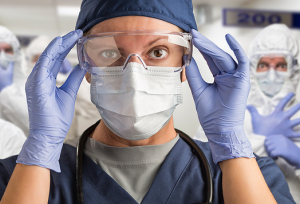Frontline healthcare workers contract COVID-19 less often than public
by
John R. Fischer, Senior Reporter | October 02, 2020

Frontline healthcare workers have a lower rate of COVID-19 antibodies than Ohioans, signifying they have contracted COVID-19 at lower rates.
Frontline healthcare workers may be contracting COVID-19 less frequently than most Ohioans, according to a new study.
Researchers at Ohio State University’s Wexner Medical Center found that fewer than 1% of its clinical staff had COVID-19 antibodies, compared to 3.3% of Ohioans who were found to in antibody surveillance conducted by the American Red Cross. The difference shows the importance of trying to contain the disease among people most likely to be exposed to it.
“The low number of healthcare workers with positive antibodies shows that it is safe for healthcare workers to provide high-intensity critical care to patients with COVID-19 without jeopardizing their own safety,” Dr. Matthew Exline, medical director of OSU Wexner's medical intensive-care unit and a co-author of the antibody study, told HCB News. “I think it reassures our colleagues and coworkers that they can care for positive patients and still be present for their families and loved ones without risking their health.”
Around 11% of the more than 146,750 cases in Ohio have been healthcare workers, a decline of 16% in all cases at the end of March, according to the state’s most recent data.
The study includes 13 university hospitals nationwide, including Ohio State, as participants. All OSU employees who tested positive for COVID antibodies were previously diagnosed with the virus.
Exline chalks up the lower prevalence of COVID among OSU’s healthcare workers as likely due to precautions put in place early on in the outbreak. Most hospitals implemented strict physical distancing, temperature checks and mask protocols before the DeWine administration required them for each citizen.
While providers across the country experienced a shortage of PPE at the beginning of the pandemic, that shortage has decreased in most areas, with hospital workers typically having access to gowns, face coverings, gloves and protective goggles or face shields.
It should be noted that COVID antibody tests are known to produce false negatives or false positive results, and many that were approved by the FDA on an emergency basis early on in the pandemic have proven to be faulty. It’s also possible for antibodies to become undetectable in a patient if they contracted the virus several months earlier.
Exline, however, says that the main point of study is how strict precautions are likely to make hospitals safer to care for patients, including those who have chronic medical conditions and are encouraged not to delay care because of the pandemic.
“The principal lesson this study shows us is the critical role that appropriate personal protective equipment plays in preventing COVID-19 transmission,” said Exline. “As the study found, providers that wore a mask with all patient interactions had a lower risk of COVID-19 than providers who did not always wear a mask. Not only does this tell us that we can protect our healthcare from COVID-19, but I think it informs us that other critical, frontline workers can safely interact with the public as long as they are given the appropriate protocols and equipment.”
|
|
|
You Must Be Logged In To Post A Comment
|
